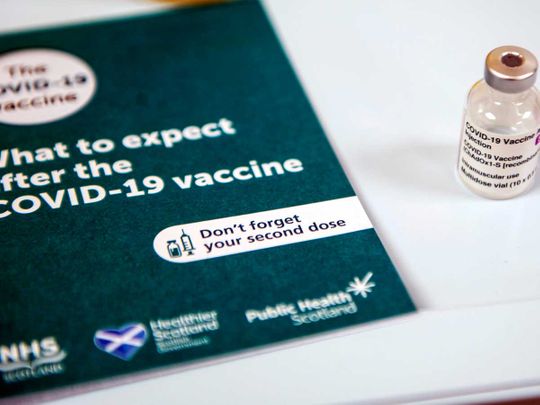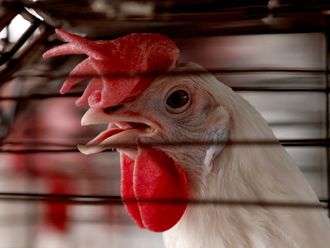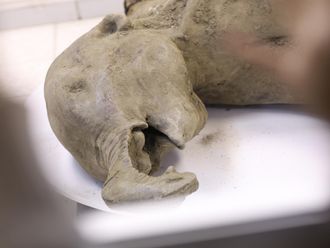
Britain on Monday became the first country to rollout the COVID-19 vaccine developed by Oxford University and pharmaceutical giant AstraZeneca to fight the spread of the new coronavirus.
Brian Pinker, an 82-year-old dialysis patient, received the first vaccine at Oxford's Churchill Hospital.
The Oxford vaccine has also been approved for emergency use in India as it embarks on an ambitious mass immunisation programme.
What is the Oxford vaccine?
The ChAdOx1 nCoV-19 vaccine is made from an adenovirus (it causes the common cold in chimpanzees), modified to prevent it from reproducing and causing infection. The vaccine is adapted to carry a part (DNA) of the coronavirus as a payload delivered to the cells in the human body. This will help trigger an immune response.
How does the vaccine work?
A coronavirus gene (with the genetic sequence of the spike protein) delivered to the human cells by the adenovirus trains the human body to create antibodies to fight the coronavirus. The gene produces the spike protein (found on the coronavirus), and the body responds with antibodies to fight SARS-CoV-2, the new coronavirus.
The body also produces T-cells containing the immune memory that protects against future infections.
How is it different from other vaccines?
Unlike the messenger RNA vaccines of Pfizer-BioNTech and Moderna, which store the instructions in single-stranded RNA, the Oxford vaccine uses double-stranded DNA, according to the New York Times.
The Oxford vaccine is more rugged than the mRNA vaccines as the adenovirus’ tough protein coat helps protect the genetic material inside. So the vaccine doesn’t have to be frozen. The vaccine can last for at least six months when refrigerated at 2–8°C.
How effective is the Oxford vaccine?
Analysis from the clinical trials on recipients of two full doses showed that the vaccine could be 62% effective in people of all ages. According to data published in the Lancet, in a smaller group of volunteers in Britain under the age of 55 who received half a dose (inadvertently) followed by a full dose, the vaccines showed 90% effectiveness.
Some reports put the efficacy at 70%. Even the lower 62% figure is a better result than the best flu jab, which is about 50% effective, BBC says.

Is it effective for older people?
Yes. The vaccine was found to be effective in people over the age of 55.
Are children eligible for the vaccine?
No, children should not be given the Oxford vaccine since its safety has not yet been assessed in people under 18. However, Oxford University is planning trials in children.
Can this vaccine be given to pregnant or breastfeeding women?
There’s no definite answer. Only your doctor can determine that. Since there are limited data on the use of the vaccine in pregnant or breastfeeding women, Britain’s Medicines and Healthcare Products Regulatory Agency has asked them to seek a doctor’s advice.
Will there be any allergic reactions?
People with a history of allergy to the ingredients in the vaccine should not receive a vaccination. So a doctor’s advice is essential, and people should reveal past allergic reactions to the doctor. An allergic reaction may result in itchy skin rash, shortness of breath and swelling of the face or tongue.
But people with known food allergies can receive this vaccine, Britain’s regulator says.
What if the vaccine produces an allergic reaction?
Rush to the nearest hospital emergency room right away if you have an allergic reaction. In some case, it can be life-threatening.
Who shouldn’t take the vaccine?
People with severe infections, accompanied by a high temperature, should not have the vaccine. So also those with bleeding or bruising, or on blood-thinning medicines.
If your immune system is weakened by medicines such as high-dose corticosteroids, immunosuppressants or cancer medicines, the vaccine is best avoided.
All these stress the need for expert advice, so talk to your doctor before getting the vaccine.
What’s the vaccine dosage?
The Medicines and Healthcare Products Regulatory Agency in the United Kingdom has approved a two full-dose vaccine regimen. It has recommended that the first dose should be followed by a second dose four to 12 weeks later.
In clinical trials, the dosage was found to be safe and effective at preventing COVID-19. No severe cases or hospitalisations were reported within 21 days of the first vaccination, Prof Sarah Gilbert of Oxford University’s Jenner Institute, who led the research, told the Guardian.
Does this vaccine also have to be stored at a freezing temperature?
Unlike the messenger RNA vaccines of Pfizer and Moderna, which have to be kept at extremely cold temperatures, the Oxford vaccine can be stored in a regular fridge, with temperatures between 2°C to 8°C. This makes it easier to deliver outside of hospital settings.
How long will the vaccine protect against COVID-19?
It’s difficult to say since it’s a new vaccine. This is true of all COVID-19 vaccines. The Oxford vaccine provides immune memory, allowing the production of antibodies to destroy the viruses it had previously encountered. But how long will the immune memory last? We don’t know. But experts have said coronavirus vaccines may have to be taken annually, like flu jabs.
Will the vaccine protect against the new strains of coronavirus?
Like all COVID-19 vaccines, there is still no evidence to suggest that the Oxford vaccine will not be effective against the new strain.






